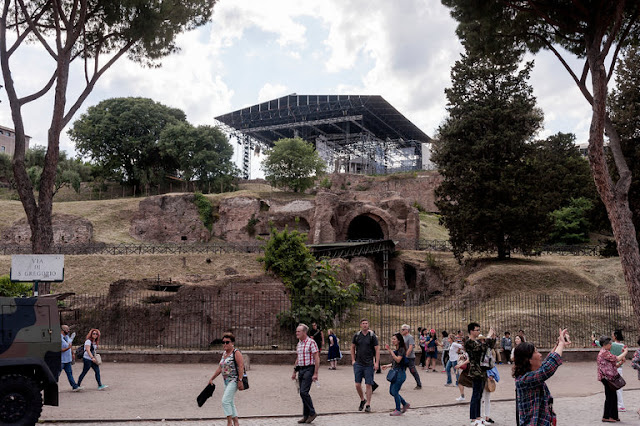By ELISABETTA POVOLEDO
A temporary theater on the
Palatine Hill in Rome is hosting the rock opera “Divo Nerone.” Credit Stefano
Montesi/Corbis, via Getty Images
ROME — The emperor Nero and
the city of Rome have always had a strained history. So it should come as no
surprise that a recent attempt to resurrect that tyrant through a
song-and-dance extravaganza titled “Divo Nerone — Opera Rock” provoked a fiery
debate here after state culture officials allowed the construction of a sizable
theater for it smack in the middle of Rome’s main archaeological site.
The 3,000-seat theater was
erected temporarily on the Palatine Hill, which Nero incorporated into his
imperial estate after the notorious fire of A.D. 64 that devastated Rome. A
temple to a sun god built here in the third century A.D. during the reign of
Elagabalus was poached centuries later for its marbles, and the theater was
assembled over some of those ruins.
“This may not be the first
grave abuse perpetuated against Rome’s monuments, but it is certainly the most
serious, both for the size of the structure,” which alters the archaeological
site, and because researchers will not be able to excavate for the three months
of the show’s run, Adriano La Regina, the former caretaker of Rome’s
antiquities, wrote in the Vatican newspaper The Osservatore Romano last month.
He called the theater an “offense to the beauty of the city.”
Other archaeologists and
conservationists labeled the construction an “eco-monster” out of place in one
of Italy’s renowned archaeological parks.
Continue reading the main
story
For some critics, too, the
musical is a symbol of how commercialism has increasingly and clumsily
encroached on the country’s cultural heritage, once seen as a sacred bastion
for research and learning.
Giorgio Adamo plays the
emperor in “Divo Nerone.” Credit Andrea Leonetti di Vagno
“There’s the growing idea
that the only way to connect with our historical patrimony is to bring it into
the contemporary world through events with mass appeal,” said Tomaso Montanari,
an art historian and leading cultural critic in Italy. “The country’s cultural
patrimony should be outside logics of consumerism or marketing.”
But the producers of the
show, which was created by a Who’s Who of mostly Italian Oscar and Grammy
winners, counter that every precaution was taken to safeguard the site. And the
rent for the space — 250,000 euro (around $280,000), with an additional 3
percent of all ticket sales — will help underfunded restorations.
“It took more than two
years of work” with public officials and archaeologists to overcome stumbling
blocks, said Jacopo Capanna, one of the producers. The production came under
scrutiny after a Roman newspaper disclosed that public funds had been allocated
toward the project. Mr. Capanna said the funds were venture capital financing
that would be reimbursed.
“Judge the product,” he
urged critics. “We all want to increase tourism to Rome, and this is one way to
do it,” he said.
The biographical musical,
which opened on Wednesday, is a mishmash — think Disney meets “House of Cards”
meets History Channel. It challenges the mostly negative depictions of Nero
relayed by Tacitus, Suetonius and Cassius Dio — ancient fake news, as it were —
with the portrait of a more nuanced antihero, who was thwarted from pursuing
what his heart really desired: a life declaiming poetry and song.
The stage is set for the
rock musical about Nero. Credit Marta Coco
“He’s a bipolar Nero,”
Giorgio Adamo, who plays the athletic and tuneful protagonist of the musical,
explained at a news conference on Tuesday. “This Nero is very fresh, modern, he
filters a pop-rock personality that anyone can understand.”
The performances are mostly
sung in English, except on Saturdays, when they are sung in Italian.
Ernesto Migliacci, the
production’s artistic director, suggested that Nero himself would have loved
the idea of the musical on the Palatine. “In this case, pop means popular, for
the people, and Nero was for the people,” he said. So the controversy over
using the Palatine falls flat “when it comes to his mentality,” he added.
Despite the criticisms,
Francesco Prosperetti, the superintendent of Rome’s archaeological sites,
explained in the show’s program that events like the musical “enhanced the
archaeological site,” and in this case drew people to an often neglected area
of the Palatine, “making it attractive for visitors again.”
But the event hasn’t made
life very attractive for a small group of nuns who live in the convent of Saint
Sebastian at the Palatine, which abuts (and is overshadowed by) the stage, who
have put up with a month’s worth of rehearsals.
“It’s impossible not to
hear,” said Sister Rosalba, the mother superior here, who confessed,
nonetheless, that she found some tunes catchy.
Musical considerations
aside, Sister Rosalba said that she was concerned that the loud music might be
having an impact on the ancient convent. “The windows certainly vibrate,” she
said. “It’s not our style to fight back, but I wish there had been some
dialogue,” she added, noting that she had not been informed that the musical
would be staged in the Palatine. “This is a beautiful space, and we need to
conserve it.”
https://www.nytimes.com/2017/06/09/arts/music/nero-rock-opera-rome-palatine-hill.html?rref=collection%2Fsectioncollection%2Fdesign&action=click&contentCollection=design®ion=stream&module=stream_unit&version=latest&contentPlacement=1&pgtype=sectionfront



No hay comentarios:
Publicar un comentario